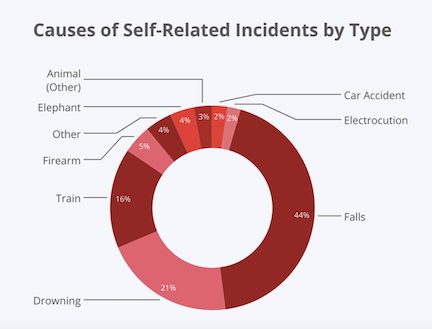Of Selfies and Sacrifice
Czech gymnast Natalie Stichova is just one of the latest of so many to tragically die while attempting to take a selfie. In August 2024 she travelled to the mountains of Bavaria with friends to capture the perfect selfie moment, posed atop the peak the majestic Tegelberg Mountain with the famous Neuschwanstein Castle (the model for Disney's Cinderella castle) spectacularly centered in the background. But this fairytale moment quickly descended into the stuff of horror films when she lost her balance, falling some 250 feet to a tragic end. Though she survived the initial fall, she died 6 days later having never regained consciousness.

According to a comprehensive global study, at least 425 people have died from selfie-related incidents between March 2014 and May 2025, spanning 49 countries. Falling from heights accounts for nearly half of all deaths and injuries. And these statistics represent just the "obvious" or forensically "verifiable" deaths by selfies.
This does not factor in the countless deaths that were peripherally related to taking a selfie or were selfie-related but that could not be verified as such during the autopsy or at the crime scene. Odds are, the number of selfie-related deaths and injuries is likely much higher.

Spiritual self-centeredness is just as dangerous.
According to one commentary:
Looking out for our own interests is natural. In fact, Jesus uses our innate self-interest as a basis for gauging our love for others: “Love your neighbor as yourself” (Mark 12:31). In other words, in the same way that you (naturally) love yourself, learn to love others. Our universe should be others-centric, not self-centric. As Paul puts it, “Do nothing out of selfish ambition or vain conceit. Rather, in humility value others above yourselves, not looking to your own interests but each of you to the interests of the others” (Philippians 2:3–4). This command leaves no room for self-centeredness.
Being focused on oneself usurps the biblical commands to love and care for our neighbors (John 13:34–35), to not pass judgment on others (Romans 14:13), to bear others’ burdens (Galatians 6:2), and to be kind and forgiving (Ephesians 4:32). Being self-centered is directly opposed to the clear command, “No one should seek their own good, but the good of others” (1 Corinthians 10:24). There are many other similar commands calling for selfless sacrifice and service to others (Romans 12:10; Ephesians 5:21; Galatians 5:26).
It concludes:
Every act of self-love is rebellion against the authority of God. Self-centeredness is rooted in one’s fleshly desire to please self more than God. In essence, it is the act of supplanting God’s authority with one’s own ego.
In such conditions, you dangle on the precipice of spiritual demise. Take your eyes off yourself. Step back from the edge. Take off the binders, and turn the lens of your focus to the needs of others!
“No one should seek their own good, but the good of others” (1 Corinthians 10:24, NIV).
"Do nothing from selfish ambition or conceit, but in humility count others more significant than yourselves. Let each of you look not only to his own interests, but also to the interests of others" (Philippians 2:3-4, ESV).
Go To Your Brother
Joseph Parker, a prominent British minister at the end of the 19th century, published an open letter to express his concerns for his friend and colleague, Charles Spurgeon. The letter read, "Let me advise you to widen the circle of which you are the center. You are surrounded by offerers of incense. They flatter your weakness, they laugh at your jokes, they feed you with compliments. My dear Spurgeon, you are too big a man for this."

Whether the concerns were valid or not, the method was certainly lacking. A true friend brings their concerns to us privately and only goes to our public with words of support and/or praise.
We would all do well to practice this same discretion in our social media interactions. Why correct a friend on a public facebook page when you can just as easily private message them? Show them you care more about them than winning an argument or looking superior.
"If your brother or sister sins, go and point out their fault, just between the two of you. If they listen to you, you have won them over" (Matthew 18:15).
Killfies
What do high cliff ledges, train tracks, animal game parks, bridges and buildings have in common? They are apparently popular sites for people to take selfies and places where over 200 people have died in the last 5 years in pursuit of that “perfect selfie.” The Economic Times of India, a country leading the world in deaths by selfies, reports that 86 people in 2016 and 73 people in 2017 died in this tragic, needless way. Since 2014, 128 have died in the course of taking selfies in this densely populated nation.
But other countries are getting involved in trying to stem the tide of such tragedies. Irish doctors reported, “The consequences of poorer spatial awareness and a focus on getting a good or daring photo has lead to multiple traumas” (Indulekha Aravind, 2/18/18). There are people in Russia that have become celebrities because of their daring self-centered photos (ibid.). Nowhere social media has gone is there an exemption from this trend, including here in our country.
Because I do not have a background in psychology, I could be wrong about this but could these extraordinary lengths to capture oneself in these kinds of photos be an act of desperation for acceptance, friendship, or even love? Could the yearning for admiration, congratulations, and adulation drive people to disregard all restraint and precaution?

I do know that, as Henry David Thoreau said in 1854, “The mass of men lead lives of quiet desperation” (Walden, ch. 1, p. 8). With selfies, we are able to project exactly the image or perception of ourselves that we want others to see. We don’t publish the unflattering or the boring. We want to be seen as valuable, relevant, and attractive. Why? Though we might lose our way in the process, human nature yearns for community and relationship (cf. Genesis. 2:24).
By contrast, God formed the Church to be a place where we focus on others. Paul wrote, “Do nothing from selfishness or empty conceit, but with humility of mind regard one another as more important than yourselves; do not merely look out for your own personal interests, but also for the interests of others” (Philippians. 2:3-4).
So much about being Jesus’ disciples gets us outside ourselves and into the lives of others—not just other Christians but people from every walk of life outside of Christ. He wants our energy, effort, and focus to be turned outward. It’s not so much about projection as service.